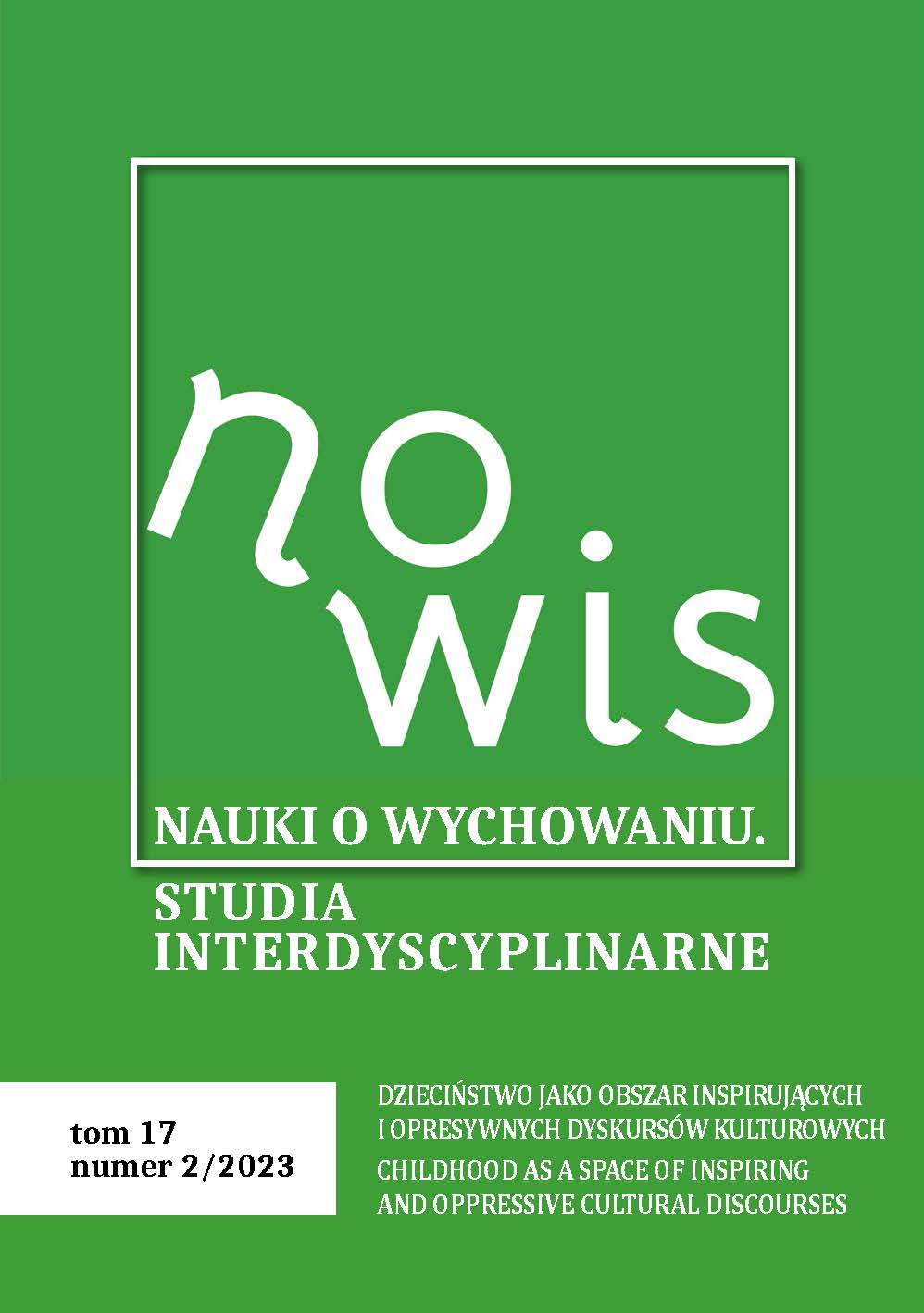The Roles of a Teacher and Oppressiveness Towards Students
DOI:
https://doi.org/10.18778/2450-4491.17.13Keywords:
epistemological beliefs, oppressiveness, entanglement in the education system, transfer of knowledge, phenomenographyAbstract
Pupils spend a large part of their lives at school, where most of their time is filled by teachers. The quality of this time depends also on the teachers’ approach to educational issues, their sense of agency, responsibility and commitment. In conducting a phenomenographic study of teachers’ epistemological beliefs, I asked teachers questions not only about issues directly related to epistemology, but also about how they perceived their role and what impact they saw as having on students’ learning process. The collected answers revealed varied teacher profiles, which I grouped into 8 distinct conceptions of teacher’s roles, out of which I selected 4 categories in which different forms of oppression were manifested. The described roles, or rather the activities which those roles manifest in, enable us to understand the context of oppressiveness. The main sources of potential oppressiveness seems to lie in teachers’ different attitudes to basic educational concepts, including, above all, the transfer of knowledge and their entanglement in the educational system, i.e. their sense of the system’s influence on the performance of their work performance.
References
Ashworth P., Lucas U. (2000) Achieving empathy and engagement: A practical approach to the design, conduct and reporting of phenomenographic research, „Studies in Higher Education”, nr 25(3), s. 295–308, https://doi.org/10.1080/713696153
Google Scholar
DOI: https://doi.org/10.1080/713696153
Bruce C. (1994) Reflections on the Experience of the Phenomenographic Interview w: Phenomenography: Philosophy and Practice Conference, R. Ballantyne, C. Bruce (red.), Brisbane, Australia, Qeensland University of Technology, s. 47–55.
Google Scholar
Cope C. (2004) Ensuring Validity and Reliability in Phenomenographic Research Using the Analytical Framework of a Structure of Awareness, „Qualitative Research Journal”, nr 4(2), s. 5–18.
Google Scholar
Creswell J. W. (2013) Projektowanie badań naukowych. Metody jakościowe, ilościowe i mieszane, tłum. J. Gilewicz, Kraków, Wydawnictwo Uniwersytetu Jagiellońskiego.
Google Scholar
Czerepaniak-Walczak M. (2006) Pedagogika emancypacyjna. Rozwój świadomości krytycznej człowieka, Gdańsk, Gdańskie Wydawnictwo Pedagogiczne.
Google Scholar
Flick U., von Kardorff E., Steinke I. (red.) (2004). A Companion to Qualitative Research, tłum. Jenner B., London, SAGE Publications.
Google Scholar
Hupbach A., Fieman R. (2012) Moderate Stress Enhances Immediate and Delayed Retrieval of Educationally Relevant Material in Healthy Young Men, „Behavioral Neuroscience”, nr 126(6), s. 819–825, https://doi.org/10.1037/a0030489
Google Scholar
DOI: https://doi.org/10.1037/a0030489
Jurgiel A. (2009) Doświadczanie szkoły przez uczniów. Rekonstrukcja fenomenograficzna, „Problemy Wczesnej Edukacji”, nr 2(10), s. 142–148.
Google Scholar
Klus-Stańska D. (2005) Mentalne zniewolenie nauczycieli wczesnej edukacji – epizod czy prawidłowość, „Problemy Wczesnej Edukacji”, nr 1 (1), s. 55–66.
Google Scholar
Klus-Stańska D. (2007) Behawiorystyczne źródła myślenia o nauczaniu, czyli siedem grzechów głównych wczesnej edukacji w: Wczesna edukacja. Między schematem a poszukiwaniem nowych ujęć teoretyczno-badawczych, Klus-Stańska D., Szatan E., Bronk D. (red.), Gdańsk, Wydawnictwo Uniwersytetu Gdańskiego, s. 15–28.
Google Scholar
Klus-Stańska D. (2009) Polska rzeczywistość dydaktyczna – paradygmatyczny taniec św. Wita w: Paradygmaty współczesnej dydaktyki, Hurło L., Klus-Stańska D., Łojko M. (red.), Kraków, Oficyna Wydawnicza „Impuls”, s. 62–73.
Google Scholar
Klus-Stańska D. (2018) Paradygmaty dydaktyki. Myśleć teorią o praktyce, Warszawa, Wydawnictwo Naukowe PWN.
Google Scholar
Lincoln Y. S., Guba E. G. (1985) Naturalistic Inquiry, Thousand Oaks, CA, SAGE Publications, https://doi.org/10.1016/0147-1767(85)90062-8
Google Scholar
DOI: https://doi.org/10.1016/0147-1767(85)90062-8
Marton F. (1986) Phenomenography: A research approach to investigating different understandings of reality, “Journal of Thought”, nr 21, s. 28–49.
Google Scholar
Marton F., Dall’Alba G., Beaty E. (1993) Conceptions of Learning, „International Journal of Educational Research”, nr 19, s. 277–300.
Google Scholar
Męczkowska A. (2002) Od świadomości nauczyciela do konstrukcji świata społecznego, Kraków, Oficyna Wydawnicza „Impuls”.
Google Scholar
Nowak-Łojewska A. (2011) Nauczyciel „konserwa” (?) – odporny na zmianę relikt w skansenowej szkole, „Studia Pedagogiczne”, t. LXIV/2011, s. 173–186.
Google Scholar
Patton M. Q. (2015) Qualitative Research and Evaluation Methods: Integrating Theory and Practice, Thousand Oaks, CA, SAGE Publications.
Google Scholar
Rubacha K. (2008) Metodologiczna struktura przedmiotu badań pedagogiki w: Konceptualizacje przedmiotu badań pedagogiki, K. Rubacha (red.), Kraków, Oficyna Wydanicza „Impuls”, s. 161–171.
Google Scholar
Urbaniak-Zając D. (2008) Rzeczywistość pedagogiczna a sposoby jej poznawania – perspektywa interpretacyjna w: Konceptualizacje przedmiotu badań pedagogiki, K. Rubacha (red.), Kraków, Oficyna Wydawnicza „Impuls”, s. 185–200.
Google Scholar
Yates Ch., Partridge H., Bruce Ch. (2012) Exploring Information Experiences Through Phenomenography, “Library and Information Research”, t. 36, nr 112, s. 96–119, https://doi.org/10.29173/lirg496
Google Scholar
DOI: https://doi.org/10.29173/lirg496
Reed B. I. (2006) Phenomenography as a Way to Research the Understanding by Students of Technical Concepts, referat zaprezentowany na konferencji Technological Innovation and Sustainability, zorganizowanej przez Núcleo de Pesquisa em Tecnologia da Arquitetura e Urbanismo (NUTAU), Sao Paulo, Brazil, [online:] https://www.academia.edu/1122550/Phenomenography_as_a_way_to_research_the_understanding_by_students_of_technical_concepts (dostęp: 5.08.2023).
Google Scholar






 The journal's website, created and edited by the NOWiS Editorial Team on the Index Copernicus platform:
The journal's website, created and edited by the NOWiS Editorial Team on the Index Copernicus platform: 





